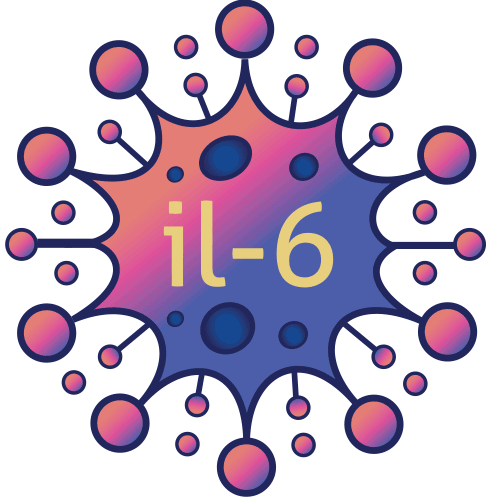Breast Cancer: The Link to IL-6 Levels
- From The Mind of AI

- Nov 18, 2024
- 3 min read
Updated: Dec 30, 2024

Breast cancer is one of the most common cancers globally, affecting millions of women each year. Research has identified a strong correlation between elevated levels of Interleukin-6 (IL-6), a pro-inflammatory cytokine, and the progression of breast cancer.
Elevated IL-6 levels contribute to tumor growth, metastasis, and treatment resistance. Understanding and managing IL-6 levels could play a pivotal role in improving outcomes for breast cancer patients.
What is IL-6?
IL-6 is a cytokine that plays a dual role in the immune response and inflammation. While it is essential for fighting infections and healing injuries, excessive IL-6 contributes to chronic inflammation and immune system dysregulation. In breast cancer, high IL-6 levels promote tumor progression, angiogenesis (blood vessel growth to tumors), and the spread of cancer cells to other parts of the body.
IL-6 and Breast Cancer
Studies show that elevated IL-6 levels in breast cancer patients are associated with:
Tumor Growth: IL-6 enhances the proliferation of cancer cells and creates a favorable environment for tumor growth.
Metastasis: High IL-6 levels promote the migration of cancer cells, increasing the likelihood of metastasis to other organs.
Treatment Resistance: IL-6 contributes to resistance to chemotherapy and hormonal therapies in breast cancer patients.
Cancer Stem Cells: IL-6 supports the growth and survival of cancer stem cells, which are often responsible for recurrence.
Supplements for Reducing IL-6 Levels in Breast Cancer
Supplement | Benefits | Recommended Dosage |
NAD+ | - Reduces IL-6 production and systemic inflammation.- Enhances mitochondrial function and cellular repair in healthy tissues.- Protects against oxidative damage during treatment. | 300 mg to 600 mg daily |
Curcumin | - Inhibits IL-6 and TNF-alpha production.- Reduces oxidative stress and inflammation in tumor microenvironments. | 500 mg to 1,000 mg daily |
Omega-3 Fatty Acids | - Provides anti-inflammatory effects and inhibits tumor-promoting cytokines like IL-6. | 1,000 mg to 2,000 mg daily |
Vitamin D | - Modulates immune response and supports healthy cell differentiation. | 2,000 IU to 5,000 IU daily |
Additional Key Supplements for Breast Cancer
Supplement | Benefits | Recommended Dosage |
Quercetin | - Reduces oxidative stress and inhibits IL-6 production.- Protects healthy cells during chemotherapy. | 500 mg to 1,000 mg daily |
Coenzyme Q10 (CoQ10) | - Supports energy production in healthy cells and reduces treatment-related fatigue. | 100 mg to 300 mg daily |
Boswellia | - Reduces inflammation and supports overall immune health. | 300 mg to 500 mg daily |
Green Tea Extract | - Contains EGCG, which reduces IL-6 levels and inhibits cancer cell proliferation. | 250 mg to 500 mg daily |
NAD+ and Its Benefits for Breast Cancer
NAD+ has shown potential as a supportive therapy for breast cancer patients:
Reduces Inflammation: NAD+ inhibits IL-6 and other pro-inflammatory cytokines, reducing the inflammatory environment that promotes tumor growth.
Supports Healthy Cells: Enhances the repair and function of healthy cells damaged during treatment.
Improves Mitochondrial Function: Boosts cellular energy production and resilience, especially in normal tissues affected by cancer therapies.
Combats Treatment Fatigue: NAD+ may help mitigate the fatigue and oxidative stress often experienced during chemotherapy or radiation.
Lifestyle Modifications to Reduce IL-6 Levels
Lifestyle Modification | Description |
Anti-Inflammatory Diet | Focus on whole, plant-based foods like fruits, vegetables, whole grains, and healthy fats to lower systemic inflammation. |
Regular Exercise | Moderate physical activity can reduce IL-6 levels and improve overall treatment outcomes. |
Stress Management | Chronic stress elevates IL-6. Practice mindfulness, yoga, or meditation to reduce stress levels. |
Adequate Sleep | Proper sleep regulates immune function and reduces inflammatory cytokines. |
Limit Alcohol | Alcohol consumption can increase IL-6 levels and should be minimized or avoided during treatment. |
Hope for Breast Cancer Patients
Reducing IL-6 levels in breast cancer patients can be an effective strategy to slow tumor progression, improve treatment outcomes, and enhance quality of life. By incorporating supplements like NAD+, lifestyle changes, and targeted medical therapies, individuals can reduce the inflammatory factors contributing to the disease. Ongoing research into IL-6 modulation and its impact on breast cancer treatment offers hope for more effective and personalized care in the future.




Comments